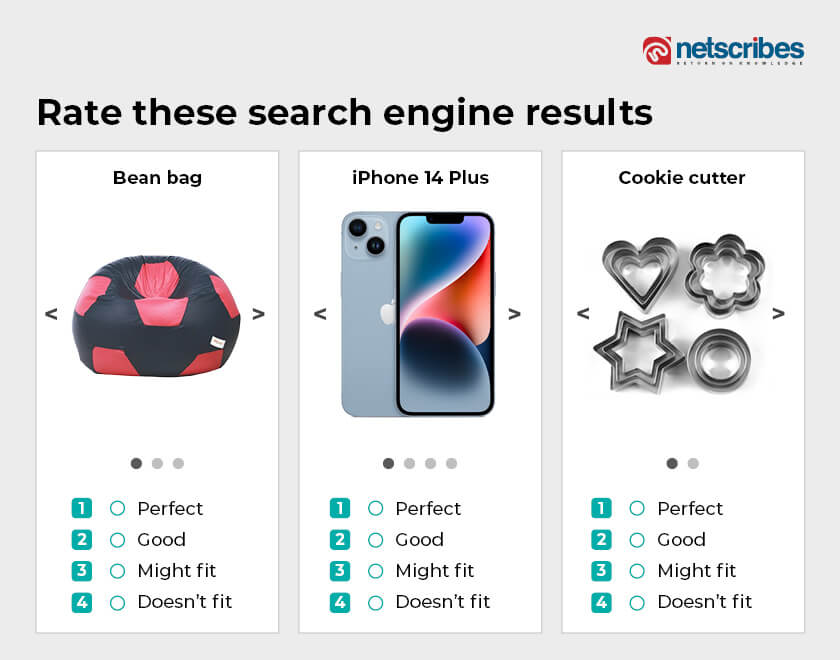Have you ever come across an ad or a product recommendation that’s entirely irrelevant to you? It could be as unintelligent as the instances depicted below. Studies suggest that almost 75% of your potential customers will be frustrated with irrelevant content or products not specific to them. Here’s where data labeling in e-commerce comes in.


But before we dive into that, check out the above instances. It is experiences like these that will soon incite the customer to head to a different e-store for their needs or unsubscribe from your emails.
Thankfully, the latest developments in AI and machine learning are enabling e-commerce companies to avoid such mishaps. Here’s where data labeling comes in. Data labeling is a process of tagging your data points so that your machine learning algorithms are trained to perform various functions accurately.
These could be generating not just logical but personalized and contextual search results based on a shopper’s profile and the latest product trends. It could be generating aggregations and characterizations of products sold, by mining its various attributes to help inventory decision-makers predict demand more precisely. ML also helps generate incredibly targeted product recommendations sanitized of potential insensitivities.
To power these and many more advanced ML algorithms, e-commerce businesses need super-precise, high-quality human-labeled training data – because the quality of your output relies on the relevance, versatility, and accuracy of your training data.
For savvy e-commerce retailers and marketplaces still mulling over potential investments in data labeling, in this article, we discuss some of its most popular applications and benefits.
1. Enhancing personalized search results and product classification
For shoppers to convert, it’s very important that they find what they are looking for on your platform. Well-structured product taxonomies along with human inputs on a product’s relevance to a certain search phrase are key in developing intuitive shopping experiences. Industry frontrunners are using a blend of automation and seasoned human labelers to fine-tune and improve the quality of their searches to heighten their customer satisfaction.

Versatile training datasets facilitate robust algorithm training for context. For instance, if a customer’s search query mentions pots and they have recently added plant seeds or fertilizers to their cart, the results should effectively reflect flower pots. However, if the shopper has been looking for ladles or food items, the results should ideally reflect cooking pots or at least suggest “in cookware” in its search expansion results on the search bar.
2. Improving NLP for chatbots
Making sense of human speech or text can be pretty complex. Colloquial usage, linguistics, grammar, and other cultural nuances make understanding a shopper’s needs no easy task. Here’s where data labelers trained in their requisite cultures help make sense of the data collected by chatbots through speech or text to label them based on very specific drilled-down categories. For instance, a phrase like ‘deliver this levis jeans tomorrow’ will be labeled as – deliver (shipping), Levis (brand), jeans (category), tomorrow (date).
It’s accurately labeled data like this, across scores of customer utterances that help develop high-quality training datasets to improve real-time responses generated by chatbots and chart out the right course of action, thus delivering unparalleled e-commerce experiences. All this, eventually with little human intervention by the retailer.
Read more: How data annotation is enhancing machine learning capabilities
3. Labelling for in-depth cataloging and visual search
Quite often a product image submitted by a seller or brand includes multiple items in a single shot. This is true for the fashion and apparel category. For instance, a particular look on a model could include not just clothing but accessories like a belt, sunglasses, handbag, and even footwear. All these needs to be accurately labeled; not to mention the fit, color, material, brand, and other attributes of the clothing and accessories themselves.
Detailed labeling by human labelers makes it easier for your e-commerce ML models to generate rich, contextual search results thereby maximizing your catalog’s exposure both via text and visual search queries.

4. Understanding customer sentiment through reviews
User or customer reviews and comments captured across your website, community forums, and social media platforms can offer a goldmine of customer insights if labeled well. They help understand the underlying customer sentiment behind a particular product. Here’s where human labeling experts help decipher fine nuances of human language. For instance: “cheap” when mentioned in context with price is labeled as a positive sentiment. However, when mentioned in the context of quality is labeled as negative.
This kind of data labeling equips e-commerce companies with tangible shopper insights that help them make informed and strategic positioning decisions.
5. Driving better price optimizations
Staying profitable amid fierce competition requires e-commerce players to adopt dynamic pricing mechanisms. By doing so, marketplaces have boosted profits by up to 25%. Providing accurate pricing suggestions and forecasts needs algorithms to constantly monitor historic and competitive data for well-rounded benchmarking. This is only possible if the pricing data of every product is accurately labeled and ready to be analyzed to recommend timely pricing optimizations.
As the e-commerce space continues to grow crowded providing distinctively seamless and intuitive shopping experiences ultimately translates to customer loyalty and repeat sales. To do this while ensuring profitability and scalability needs human-in-the-loop technology solutions like data labeling. Leading e-commerce retailers, brands, and marketplaces have been outsourcing their data labeling and annotation tasks to Netscribes over the years and are seeing the results markered by higher ROI and customer satisfaction. To know how we can help you join the league of these e-commerce winners, contact us today.






